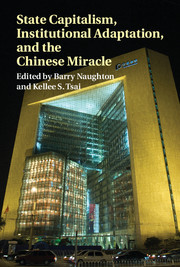Description
State Capitalism, Institutional Adaptation, and the Chinese Miracle
Comparative Perspectives in Business History Series
Coordinators: Naughton Barry, Tsai Kellee S.
This volume explores how Chinese institutions have adapted to the new challenges of 'state capitalism'.
Language: English
Subject for State Capitalism, Institutional Adaptation, and the...:
Publication date: 06-2015
Support: Print on demand
Support: Print on demand
Description
/li>Contents
/li>Biography
/li>
China's stunning growth rates have corresponded with the rise of 'state capitalism'. Since the mid-2000s, China's political economy has stabilized around a model where most sectors are marketized and increasingly integrated with the global economy; yet strategic industries remain firmly in the grasp of an elite empire of state-owned enterprises. What are the implications of state capitalism for industrial competitiveness, corporate governance, government-business relations, and domestic welfare? How does China's model of state capitalism compare with other examples of state-directed development in late industrializing countries? As China enters a phase of more modest growth, it is especially timely to understand how its institutions have adapted to new challenges and party-state priorities. In this volume, leading scholars of China's economy, politics, history, and society explore these compelling issues.
1. Introduction: state capitalism and the Chinese economic miracle Kellee S. Tsai and Barry Naughton; Part I. Evolution of the State Sector: 2. State-owned business and party-state regulation in China's modern political economy Margaret M. Pearson; 3. The transformation of the state sector: SASAC, the market economy, and the new national champions Barry Naughton; Part II. Outcomes and Processes: 4. Stability, asset management, and gradual change in China's reform economy Doug Guthrie, Zhixing Xiao and Junmin Wang; 5. The emergence and evolution of Chinese business groups: are pyramidal groups forming? Dylan Sutherland and Ning Lutao; 6. Competition and upgrading in Chinese industry Loren Brandt and Eric Thun; Part III. The Big Picture: Historical, Social, and Systemic Perspectives: 7. Explaining the dynamics of change: transformation and evolution of China's public economy through war, revolution, and peace, 1928–2008 Morris L. Bian; 8. The evolution of a welfare state under China's state capitalism Mark W. Frazier; 9. Did China follow the East Asian development model? Andrea Boltho and Maria Weber.
Barry Naughton is So Kwanlok Professor at the Graduate School of International Relations and Pacific Studies, University of California, San Diego. He is a member of the Council on Foreign Relations and a non-resident fellow of the Brookings Institution in Washington, DC. He is author of many books, including Growing Out of the Plan: Chinese Economic Reform, 1978–1993 (Cambridge University Press, 1995, winner of the Masayoshi Ohira Memorial Prize) and The Chinese Economy: Transitions and Growth. He edited the volume Wu Jinglian: Voice of Reform in China, and has published extensively in leading economics and social science journals. He also publishes regular quarterly analyses of China's economic policy-making online at China Leadership Monitor.
Kellee S. Tsai is Division Head and Professor of Social Science at the Hong Kong University of Science and Technology, and Professor of Political Science at Johns Hopkins University. She was previously employed at Morgan Stanley and Women's World Banking and has consulted for the World Bank. She has served on the Board of Directors of the National Committee on US-China Relations. She is the author of Back-Alley Banking: Private Entrepreneurs in China, Rural Industrialization and Non-Governmental Finance in Wenzhou (co-authored in Chinese), and Capitalism without Democracy: The Private Sector in Contemporary China. She also co-edited the volume Japan and China in the World Political Economy, and her articles have appeared in journals such as the China Journal, China Quarterly, Comparative Political Studies, Perspectives on Politics, World Development, and World Politics.
Kellee S. Tsai is Division Head and Professor of Social Science at the Hong Kong University of Science and Technology, and Professor of Political Science at Johns Hopkins University. She was previously employed at Morgan Stanley and Women's World Banking and has consulted for the World Bank. She has served on the Board of Directors of the National Committee on US-China Relations. She is the author of Back-Alley Banking: Private Entrepreneurs in China, Rural Industrialization and Non-Governmental Finance in Wenzhou (co-authored in Chinese), and Capitalism without Democracy: The Private Sector in Contemporary China. She also co-edited the volume Japan and China in the World Political Economy, and her articles have appeared in journals such as the China Journal, China Quarterly, Comparative Political Studies, Perspectives on Politics, World Development, and World Politics.
© 2024 LAVOISIER S.A.S.




